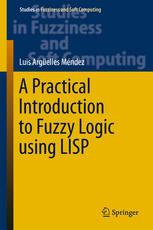

Most ebook files are in PDF format, so you can easily read them using various software such as Foxit Reader or directly on the Google Chrome browser.
Some ebook files are released by publishers in other formats such as .awz, .mobi, .epub, .fb2, etc. You may need to install specific software to read these formats on mobile/PC, such as Calibre.
Please read the tutorial at this link: https://ebookbell.com/faq
We offer FREE conversion to the popular formats you request; however, this may take some time. Therefore, right after payment, please email us, and we will try to provide the service as quickly as possible.
For some exceptional file formats or broken links (if any), please refrain from opening any disputes. Instead, email us first, and we will try to assist within a maximum of 6 hours.
EbookBell Team

4.0
6 reviewsThis book makes use of the LISP programming language to provide readers with the necessary background to understand and use fuzzy logic to solve simple to medium-complexity real-world problems. It introduces the basics of LISP required to use a Fuzzy LISP programming toolbox, which was specifically implemented by the author to “teach” the theory behind fuzzy logic and at the same time equip readers to use their newly-acquired knowledge to build fuzzy models of increasing complexity. The book fills an important gap in the literature, providing readers with a practice-oriented reference guide to fuzzy logic that offers more complexity than popular books yet is more accessible than other mathematical treatises on the topic. As such, students in first-year university courses with a basic tertiary mathematical background and no previous experience with programming should be able to easily follow the content. The book is intended for students and professionals in the fields of computer science and engineering, as well as disciplines including astronomy, biology, medicine and earth sciences. Software developers may also benefit from this book, which is intended as both an introductory textbook and self-study reference guide to fuzzy logic and its applications. The complete set of functions that make up the Fuzzy LISP programming toolbox can be downloaded from a companion book’s website.